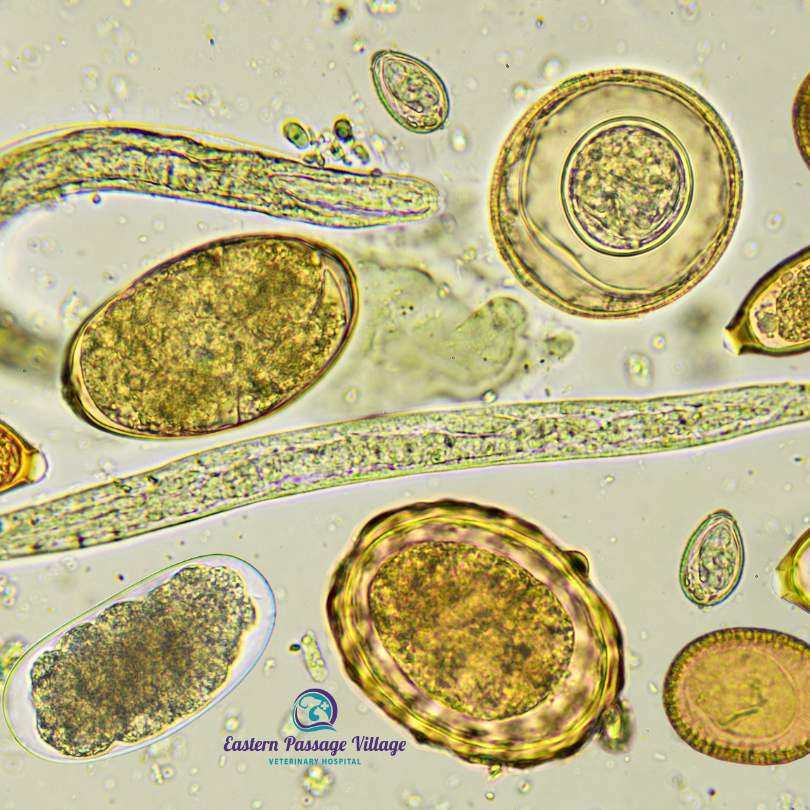By: Dr. Emma Bush (DVM)
When we think about parasite prevention products, we often think about external parasites like fleas and ticks. However, prevention of internal (intestinal) parasites (included, but not limited to worms) is also important for your dogs and cats. This is done through what is commonly called deworming.
Deworming is recommended monthly, year-round in at risk pets. This list includes, but is not limited to pets that go outside, pets that hunt, pets that ingest feces, pets that go to boarding or daycare, and many more.
The alternative to regular, year-round, monthly deworming is bringing in regular fecal samples for analysis and treating based off of fecal sample results. However, the downfall to this is that some intestinal parasites are only shed intermittently, so multiple fecal samples would be required to get an accurate representation of the parasites present.
Owners will sometimes note certain types of intestinal parasites in the feces of their pets. Most commonly, they will notice tapeworm segments which look like little grains of rice present around the anus or in the feces of an infected pet. However, many intestinal parasites or worms shed only their eggs in the feces, and these are not visible without microscopy. As such, just because you are not seeing worms, this does not mean that your pet does not have an intestinal parasite burden.

A brief introduction to some common types of intestinal parasites
- Tapeworm
As mentioned above, the most common type of tapeworm will shed segments from its tail that are noted around the anus or in the feces of our pets. This worm lives in the small intestine of domestic pets, where it is anchored to the wall of the intestine to absorb nutrients while depositing egg sacks that the host will shed in their feces. These worms can grow up to 6 inches or more in total length. The lifecycle of the tapeworm is closely related to that of the flea and domestic pets become infected with these worms after swallowing a flea that has a larval tapeworm in it. Because of this, it is recommended that if you see fleas, to also treat for tapeworms (and vice versa; or, better yet, to give monthly, year-round preventive products). - Hookworm
This type of intestinal parasite is particularly important in puppies. These worms live in the small intestine of their host in their adult stage, and lay eggs that are passed in the host animal’s feces. They infect their hosts through direct penetration through the skin; ingestion; and/or, for puppies, through placental blood flow and/or through the mother’s milk. Because these worms feed by sucking their hosts’ blood, in a young puppy, these infestations, if left untreated, can be fatal. - Roundworm
There are different kinds of roundworms that affect dogs and cats and, though their lifecycles differ, treatment protocols are overall similar. Similar to the hookworm, pets become infected through consumption (either from the environment or from a prey animal), through the placenta or from nursing infected milk. What is important to note for these infestations is that fresh feces are not infectious for this type of parasite – it takes 30 days for the shed parasite to become infectious. As such, strict removal of feces is important in limiting spread and re-infection with this parasite. Roundworm is a common cause of diarrhea and vomiting in young animals, and can cause the appearance of a dull hair coat and “pot-belly”. An owner may see the worms in their pets vomitus or diarrhea – they are long, white and have been described as looking like spaghetti (which, though disgusting, is a quite accurate description). - Giardia
Giardia is different from the above-mentioned parasites in many ways, one of the bigger ones being that they are single-celled organisms. However, they cause diarrhea and are often treated with certain types of dewormers, so are worth mentioning here. This organism dwells in the host intestine and is species specific. Consumption from contaminated water is a common source of infection. Diarrhea can commonly be present prior to active shedding of giardia and infection is common in kennel and group-housing situations.
An Emerging Parasite: Echinococcus
There is a type of tapeworm called Echinococcus multilocularis that is also worth acknowledging as it is of growing concern in the Atlantic provinces. Though primarily a parasite of wild species including coyotes and foxes, this parasite can also infect domestic dogs, predominantly through ingesting rodents or rabbits (intermediate hosts of this parasite). This parasite can cause large cysts to form within visceral organs such as the liver and lungs. Worryingly, similarly to many of the above mentioned parasites, it can also infect humans, and as such it is a very concerning zoonotic disease.
This is only a brief introduction to some common and concerning intestinal parasites that are present in the Atlantic provinces and is by no means an exhaustive list.
Some common rules of thumb to help to protect against parasite infection in both you and your pets is through are proper hand washing for owners and pet handlers, as well as regular deworming of your pets and removal and proper disposal of pet feces.
Different parasite prevention products address different parasites. Please discuss with your veterinarian about what the best deworming and parasite prevention protocol would be for your pet.
If you have questions about parasite prevention in your pets, please contact your veterinarian.
References used:
Giardia: https://veterinarypartner.vin.com/default.aspx?pid=19239&id=4952529
Hookworm: https://veterinarypartner.vin.com/default.aspx?pid=19239&id=4951969
Roundworm: https://veterinarypartner.vin.com/default.aspx?pid=19239&id=4951364
Tapeworm: https://veterinarypartner.vin.com/default.aspx?pid=19239&id=4951442
E. multi: https://vcacanada.com/know-your-pet/echinococcosis-in-dogs
